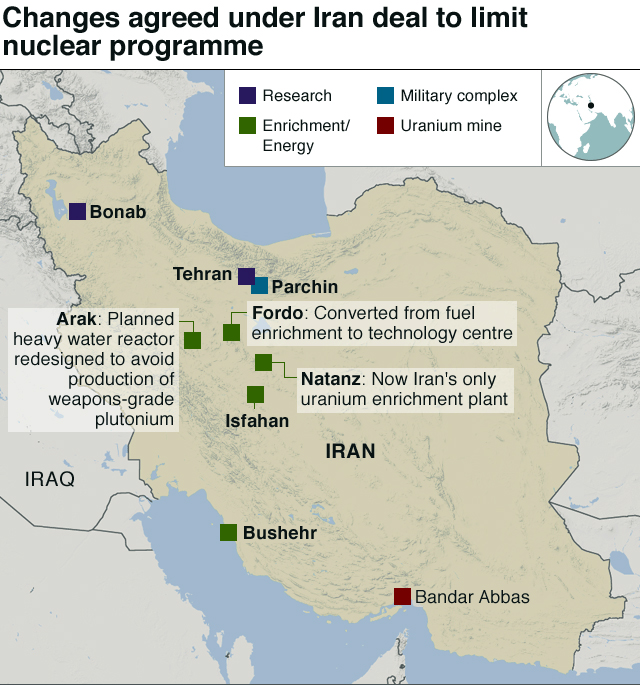International Relations
IAEA - Iran Deal over Nuclear Inspections
- 23 Feb 2021
- 5 min read
Why in News
Iran and the International Atomic Energy Agency (IAEA) have agreed to temporary measures to offset Iran's decision to restrict access to inspectors.
- In December 2020, Iran’s Parliament passed the law demanding a suspension of some inspections if the USA failed to lift sanctions.
Key Points
- About:
- Iran will stop the implementation of the voluntary measures as envisaged in the 2015 nuclear deal, as of 23rd February 2021.
- However, Iran will continue to implement fully and without limitation its Comprehensive Safeguards Agreement with the IAEA as before.
- Under a comprehensive safeguards agreement, the IAEA has the right and obligation to ensure that safeguards are applied on all nuclear material in the territory, jurisdiction or control of the State for the exclusive purpose of verifying that such material is not diverted to nuclear weapons or other nuclear explosive.
- No access will be given to the IAEA beyond safeguards of the Non-Proliferation Treaty.
- Iran would deny the IAEA real-time access to footage from surveillance cameras installed at some sites and, if sanctions are not lifted within three months, delete it.
- Significance of the Deal:
- It certainly seems likely to defuse a mounting sense of crisis surrounding Iran's nuclear activities and efforts to breathe new life into the 2015 nuclear deal.
- It significantly reduces the impact of a new Iranian law, passed in 2020, which would have seriously hampered the IAEA's ability to do its work.
- 2015 Nuclear Deal:
- In 2015, Iran with the P5+1 group of world powers - the USA, UK, France, China, Russia, and Germany agreed on a long-term deal on its nuclear programme.
- The deal was named as Joint Comprehensive Plan of Action (JCPOA) and in common parlance as Iran Nuclear Deal.
- Under the deal, Iran agreed to curb its nuclear activity in return for the lifting of sanctions and access to global trade.
- The agreement allowed Iran to accumulate small amounts of uranium for research but it banned the enrichment of uranium, which is used to make reactor fuel and nuclear weapons.
- Iran was also required to redesign a heavy-water reactor being built, whose spent fuel could contain plutonium suitable for a bomb and to allow international inspections.
- USA Abandoning the Deal in 2018:
- In May 2018, the USA abandoned the deal criticising it as flawed and reinstated and tightened its sanctions.
- Since sanctions were tightened, Iran has been steadily breaking some of its commitments to pressure the remaining signatories to find a way to provide sanctions relief.
- The USA held that it would attempt to force all countries to stop buying Iranian oil and put pressure on Iran to negotiate a new nuclear accord.
- IAEA’s Stand:
- In 2018, an International Atomic Energy Agency’s report concluded that Iran’s stockpile of uranium and heavy water, as well as its implementation of additional protocols, were “in compliance” with the agreement.
International Atomic Energy Agency
- About:
- Widely known as the world’s “Atoms for Peace and Development” organization within the United Nations family, the IAEA is the international centre for cooperation in the nuclear field.
- Establishment:
- The IAEA was created in 1957 in response to the deep fears and expectations generated by the discoveries and diverse uses of nuclear technology.
- Headquarter: Vienna, Austria.
- Objective:
- The Agency works with its Member States and multiple partners worldwide to promote safe, secure and peaceful use of nuclear technologies.
- In 2005, it was awarded the Nobel Peace Prize for their work for a safe and peaceful world.
- The Agency works with its Member States and multiple partners worldwide to promote safe, secure and peaceful use of nuclear technologies.
- Functions:
- It is an independent international organization that reports annually to the United Nation General Assembly.
- When necessary, the IAEA also reports to the UN Security Council in regards to instances of members’ non-compliance with safeguards and security obligations.







